Mayor Bill de Blasio rounds the corner of a Gracie Mansion porch wearing a broad smile. It’s a Friday afternoon in late August, and he’s had a good week. Three days ago, he announced rising test scores for the city’s third- through eighth-graders. Two days ago, he dominated his main Democratic-primary challenger, Sal Albanese, in the first of two debates. A newly released report shows city unemployment dropping to record lows, and polls predict de Blasio should cruise to a reelection victory in November.
This being New York, however, problems and criticisms keep step with the good news. He is locked in his latest battle with Governor Andrew Cuomo, this time over how to fix the crumbling subway system. Two investigations failed to find any indictable offenses connected to de Blasio’s fund-raising operation but left the impression that money bought access to the mayor. Despite his first-term successes, de Blasio’s public-approval rating remains an ambivalent 50 percent. Homeless shelters are at capacity. As he folds his six-foot-six-inch frame into an armchair angled toward the East River, the mayor is eager to tout his first-term record — but also bristling at his antagonists and freshly determined to push his progressive agenda over the next four years, and not just in New York.
Chris Smith: You worked for a mayor, David Dinkins. As public advocate, you kept an eye on a mayor, Michael Bloomberg. And you ran for mayor. But there are things you can’t know until you are in a job. What have you learned?
Bill de Blasio: I had as good a field vision of the mayoralty as anyone. I spent four years in the building. The difference was, I didn’t realize how amazing the changes were over the last few decades. So when I left at the end of the Dinkins administration, 1993, pre–digital age, I look back on that time and think of it as positively quaint in terms of the level of activity. Those were much tougher times in the city, but the pace was slower and more mannered. The thing I didn’t fully get until I got into office was just the speed is extraordinary at this point. It’s fueled by the digital age, obviously. Both the speed with which people can communicate with each other and the expectations of being able to address things in real time that would have been impossible in the past. But also the public dynamics — the way that you’re, understandably, expected to have an answer for something that comes up in the middle of a press conference on everyone’s screen. It took a lot to adjust to that.
It’s better to be assertive, proactive, blunt. I knew that coming in the door. Early on, for instance, with homelessness, I should have been a lot blunter with people about how difficult a problem it was and how long it would take to solve. When I explain that to people and put it in very human terms, and also remind people who the homeless are — today there are more working people and families — I tend to find it becomes a very reasonable discussion. I found that on Rikers, too.
Speaking of Rikers, the governor took another shot at you yesterday over your ten-year plan to close the jail.
I saw.
What’s this really about between you and him?
Despite everyone’s efforts to try and specify, this is one case where it’s worth generalizing. The history of governors and mayors in New York is a tortured one.
But this is personal.
Wait, wait, wait. Are you there, Chris?
What do you mean?
Meaning you’re obviously evincing a bias, and you’re not actually asking “Is it so personal or is it something else?” And I’m telling you, one part of it is purely structural. Where you stand is where you sit. Rockefeller and Lindsay, Koch and Cuomo, Bloomberg and Cuomo — this is not a news flash. There’s a natural tension between mayors and governors that’s quite profound.
No question. I’ll go back and look it up, but none of those guys went out of their way to take shots the way —
I have the deepest respect for you, you’re a fine journalist, and you do not know your history. Go check, go check, my friend. Particularly Rockefeller and Lindsay you’ll enjoy.
There’s a major, major personal element to you and Cuomo.
Some of this is plainly structural. The governor of New York has a very different set of interests than the mayor of New York City in terms of protecting constituencies, and right now, there have been a number of times when I’ve felt the governor affronted the needs of New York City. And my job’s to stand up for the people of New York City. I’m taking the Ed Koch playbook. He said if a governor does something good for New York City, support him, praise him, thank him. And if a governor says something that’s going to hurt the people of New York City, you’ve got to confront him. There are times, and this last round on mayoral control of education was a good example, we got on the same page and there was agreement on how to proceed and something good happened. We have, on top of that, real philosophical differences. Real differences of approach. I’m not saying nothing’s personal.
You went on NY1 and called him vindictive.
Yeahhhh. I’m saying some of this is structural, some of this is ideological, some of this is just naturally what happens when people disagree on an issue, and your engaging on that issue does not stop me from getting things done with the governor and his team every single day, because we do that. Yeah, we do have a long personal relationship, and that’s a component. But too often the media has tried to turn it into some Hatfield-and-McCoy thing without asking how much of it is ideological and how much of it is structural. And it’s quite evident to me that it’s a rich mixture and it should be seen for what it is.
Are you open to supporting a progressive challenge to the governor next year?
I’m talking about this year.
Are you open to it?
I’m talking about this year. I’m in a mayoral election this year. That’s what we’re talking about.
So I’ll take that as a yes.
No, you shouldn’t take an answer like that as anything. I’m not talking about 2018 right now.
You’re unwilling to commit to endorsing him.
No, I’m literally not willing to talk about 2018 right now. Period. So if you interpret it, that’s not fair to your readers, with all due respect.
Would you vote for him in a presidential primary?
It’s not 2020. Ask me in 2020.
Is he a plausible president?
Again, I’m not here to do punditry on the next presidential race, which is three years away. I’m just not going to get into it. You can happily ask, but I’m not going to talk about the 2020 campaign. We’re here to talk about the 2017 mayoral campaign, which is happening right now.
There’s been a lot of talk in the past few months from you and the governor about the subway crisis. Is the system going to need to get even worse before it gets better? Or is the state doing enough right now?
It’s not doing enough, that’s quite clear. The State of New York is responsible for the MTA and has been for decades. The governor famously took full credit for the Second Avenue subway last year and in so many ways has made clear — naming the head of the MTA, controlling the budget of the MTA — that the state controls the MTA. And that’s very healthy, to actually finally have responsibility assigned, just the way it would be in my case, on police, on schools, on sanitation, you name it. The state needs to fund the MTA appropriately, which means starting by giving back the $456 million they diverted in MTA funds. And then we all need to agree on a long-term plan. I believe the millionaires tax is the best long-term plan. There are other proposals, obviously, that are worth discussion. But I think it’s a pretty linear situation. I don’t think the dynamics in the subway need to get any worse. I think it’s time to decide which path we’re gonna take.
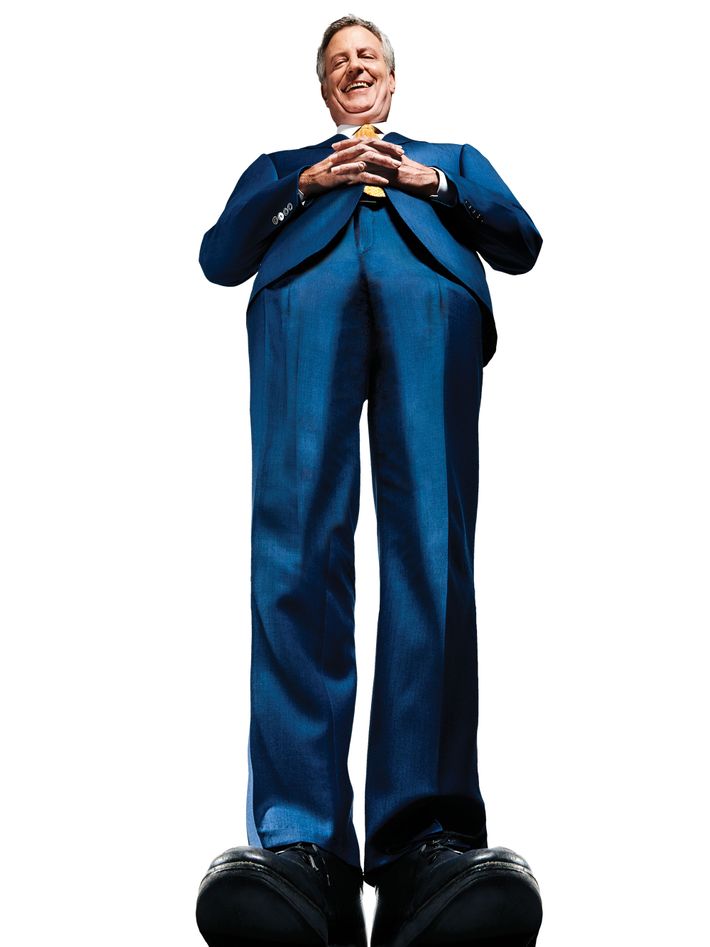
Four years ago, your Republican opponent was predicting that if de Blasio is mayor, crime is going to explode.
I’m trying to think of those great ’70s movies. Fort Apache, the Bronx, and what was the other one?
The Warriors?
The Warriors. Exactly! And Escape From New York. Those were the images they had.
So that hasn’t happened.
Quite the opposite.
If my numbers are current, murders are down 22 percent, shootings are down 20 percent.
From last year.
Arrests in the neighborhood-policing areas are dropping ten times faster than in the rest of the city.
And going down further.
Did everyone just get nicer?
Yeah, we had a niceness program here in New York City. No. We were barking up the wrong tree. The fight was over stop and frisk, and it was a very important discussion per se, don’t get me wrong. But there was not an actual working relationship between police and community in a lot of black and Latino neighborhoods, period. And anyone who really looks at policing and listens to the practitioners understands that the hearts and minds matter.
How much of the drop is because of precision policing — the better use of data to identify truly bad people?
It’s a big deal. Absolutely crucial. In the eyes of our police leadership, there are less than 5,000 people in this city who are doing most of the violent crime. When you can really pinpoint resources on those people, you can start to see even more dramatic drops, and that’s what happened.
A very crucial point in this evolution was [then–police commissioner Bill] Bratton making the decision to retrain the entire police force after the Garner incident. We also added 2,000 more officers, which opened up the space for officers to be able to have the time and energy to spend building relationships. We think we’re going to be able to reduce crime a lot more, because now all these strategies are firing on all cylinders.
I’m wondering about a pivotal moment early on. You had the shootings in Brooklyn. You had cops in the hospital turning their backs on you. And then at the funerals, same thing, hundreds of cops. What do you remember, leaving those funerals — being angry, being scared, being —
I was sad. This is about the families involved, this is about the officers we lost. It’s not about politics. And let’s face it, some people politicized it. And it was painful and it was disrespectful to the family; it was tearing at the social fabric of the city, and it was cynical. But it was also clear to me that it did not reflect the majority of officers, by any stretch.
How often now do you go to roll calls? How often do you sit down and talk to cops?
I talk to a lot of cops on the street. I don’t go to too many roll calls, I go to some. But I have a regular habit of talking to officers about their work.
It’s a big, big department —
Thirty-six thousand people.
So it’s unfair to generalize, but do you think you are on good terms with the cops now?
Let me finish the point to answer the question. Thirty-six thousand people. If you know anything about human beings, you know that implicitly that means there’s going to be a broad range of views, and that’s what I find. They know that there’s more cops on the beat, they know they’ve gotten more equipment, more protective gear from this administration. They know I chose Bill Bratton and Jimmy O’Neill, two people they greatly respect. A lot of officers were not happy at the end of the previous administration, and they felt that there was often very punitive treatment within the NYPD, even for minor mistakes. It’s something I think both Bratton and O’Neill have very effectively addressed. So I don’t think it really matters if I’m going to win a popularity contest. What I think matters is, do a lot of officers know that my administration has done things to help everyday cops and make them more effective? Yes, I believe a lot of officers know that.
Do you think the way the press covered the fund-raising investigations tarred your administration with a pay-to-play reputation?
No, because I talk to everyday New Yorkers all the time. Tomorrow night I think is going to be my 34th town-hall meeting. People never bring up the issues from the investigations, because I think there was a broad understanding in the public that there was an immense amount of scrutiny that found absolutely nothing wrong. Everyday New Yorkers are much more concerned with kitchen-table issues. Some political insiders, maybe they’ve come to certain conclusions. But for everyday New Yorkers? They didn’t see anything wrong, and they’re right, because there wasn’t anything wrong. The town-hall meetings are three-hour, deeply felt affairs, right in the middle of communities. If you look at this weekend, I spoke in two churches in southeast Queens, met people in Forest Hills out on the street for an hour, met people for about an hour in Orchard Beach, the Bronx. Bluntly, the media doesn’t tend to cover that stuff because it doesn’t tend to come with controversy.
Do you think the Times, in particular, is determined to prove you are corrupt?
I think there are some in the media who are having trouble letting go.
Do you think the focus on how you still travel to Park Slope for your gym workouts fed an image of you as self-absorbed?
There are some in the media who peddle that notion. Everyday people do not raise that concern to me, ever. The thing that I am surprised by is the absence of a reckoning in terms of the results. The question with any administration is, what have you produced? Michael Bloomberg famously went to Bermuda on many weekends. I could not conceive of such a thing. But the question people asked themselves was not did he go to Bermuda, but did he get things done they wanted done? Anyone with a brain knows being mayor of New York City is a 24/7 job. The issues facing us are never out of my mind, ever. If the worst you can say about someone is he goes to the gym, that’s a pretty good situation in today’s world.
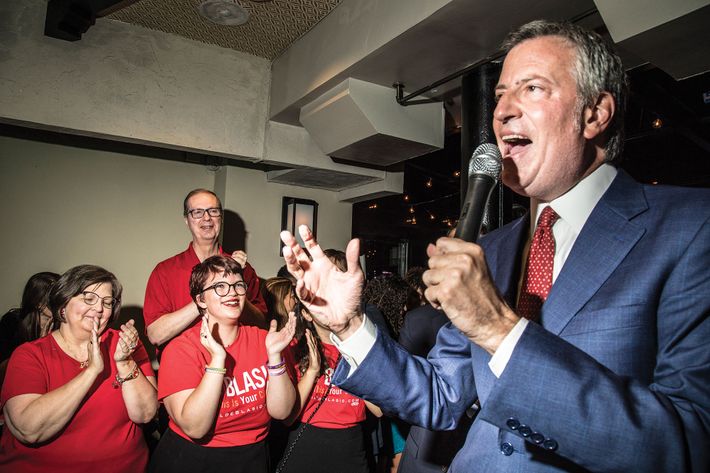
In 2013, you ran on reducing income inequality. Where has it been hardest to make progress? Wages, housing, schools?
What’s been hardest is the way our legal system is structured to favor private property. I think people all over this city, of every background, would like to have the city government be able to determine which building goes where, how high it will be, who gets to live in it, what the rent will be. I think there’s a socialistic impulse, which I hear every day, in every kind of community, that they would like things to be planned in accordance to their needs. And I would, too. Unfortunately, what stands in the way of that is hundreds of years of history that have elevated property rights and wealth to the point that that’s the reality that calls the tune on a lot of development.
I’ll give you an example. I was down one day on Varick Street, somewhere close to Canal, and there was a big sign out front of a new condo saying, “Units start at $2 million.” And that just drives people stark raving mad in this city, because that kind of development is clearly not for everyday people. It’s almost like it’s being flaunted. Look, if I had my druthers, the city government would determine every single plot of land, how development would proceed. And there would be very stringent requirements around income levels and rents. That’s a world I’d love to see, and I think what we have, in this city at least, are people who would love to have the New Deal back, on one level. They’d love to have a very, very powerful government, including a federal government, involved in directly addressing their day-to-day reality.
It’s not reachable right now. And it leaves this friction, and this anger, which is visceral. I try to explain the things we can do. It’s a little bit of a Serenity Prayer — let’s talk about the things we can fix. The rent freeze we did reached over 2 million people. I’ve talked to people who were going to be evicted, and we stopped the eviction by giving them a free lawyer. And I’ve talked to people who got affordable housing under our plan for 200,000 apartments.
In the most recent housing negotiations, you achieved two of your highest priorities — ending tax breaks for luxury condos and mandating the construction of affordable housing when projects are subsidized. But you could have taken power from developers by walking away from the 421a tax-exemption program, keeping the revenue, and having the city build its own housing.
We didn’t feel it would leverage the amount of affordable-housing creation that 421a did. It literally came down to modeling out what’s going to work best. We don’t think we would get anywhere near as many units as if we leveraged the public element of the equation to get the maximum private investment. Our affordable-housing plan has a very substantial middle-class component. Now, some advocates don’t like that. They would like it all to be for low-income folks. I believe the mission is to reflect the historic mix that has made this place so extraordinary. It’s an eyes-wide-open decision.
Unemployment is at record lows, yet the income gains have largely gone to upper-income brackets. So the income-inequality you ran against has worsened.
There’s two ways to address it: Ask more from the wealthy in terms of their obligation to society, first and foremost from taxes. Or raise wages and benefits for everyday people. The good news in New York City is we do see some increase in wages as the economy strengthens. Paid sick leave reached another half-million people. We helped to lead the charge to increase the minimum wage, and people are starting to feel that.
The problem is the top end. In very few ways can we address the rampant growth of wealth among the one percent. The state and the federal government have the power to do that. I called for a tax on the wealthy to fund pre-K. We didn’t achieve that, but we did get the money for pre-K from the state. Now I’m calling for a millionaires tax to fix the subways and to provide the half-cost fare for low-income New Yorkers. If we’re going to have a strong social fabric, if people are going to have faith it’s a fair and open society, they need to see the wealthy paying their fair share. It frustrates me greatly that we don’t have the power here to tax the wealthy in this city.
So in a second term, do you try to change that, or is that a lost cause?
It’s not a lost cause, because the balance of power I think is going to shift in New York State for several reasons; most importantly, I think there will be a Democratic State Senate, and that’s going to open up the possibility of more fairness — not just toward New York City, but toward localities all over the state.
You see what’s happening in Texas, and we all lived through Sandy. What’s one important new idea you’d pursue in a second term to protect the city from the next superstorm?
I think it is to deepen the implementation of the plan we have in place. We have a $20 billion resiliency plan, which, for example, helped us achieve the 5.5-mile boardwalk reconstruction in the Rockaways — and that is not just a boardwalk, it’s also a physical barrier; it was built as a resiliency measure. We’re going to be doing things like that all over the city. I think the key is to just keep moving along quickly.
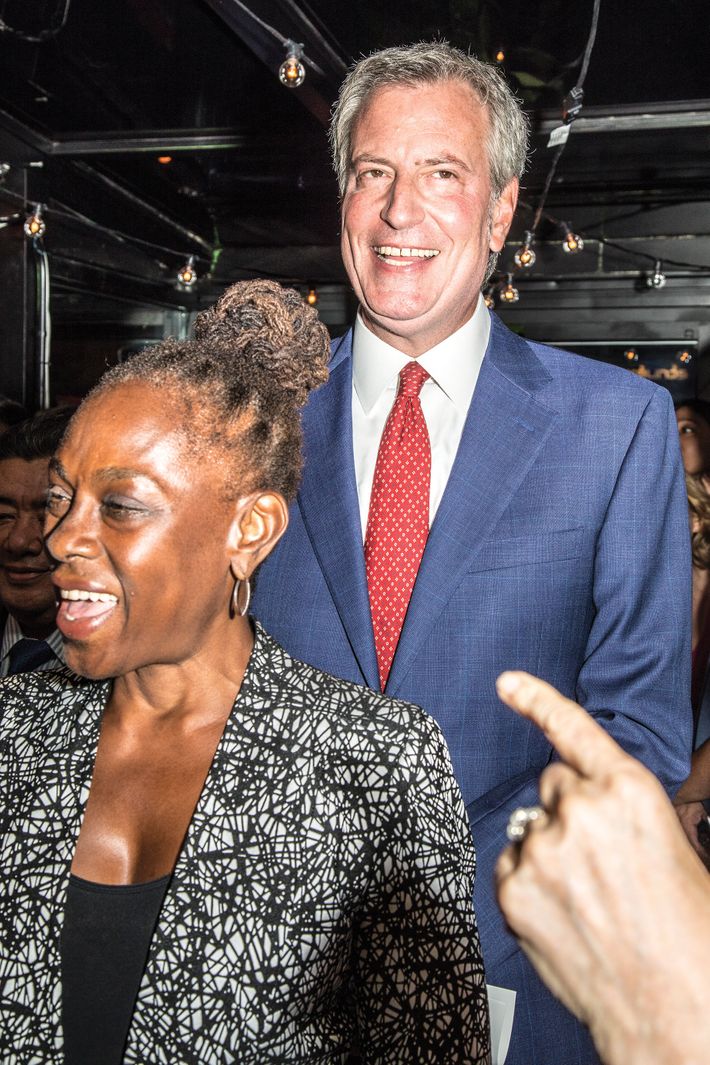
The school system: You won full-day pre-K and plan to start 3-K. Test scores going up, graduation rates going up. But the gains are uneven.
The gains are consistent across all demographics. The achievement gap is not closing.
And one of the underlying problems is that the city remains segregated, economically and racially. What tools can you use in a second term — maybe rezoning more school districts?
If you want to talk about breaking down segregation, all of us have to honestly acknowledge it’s based in 400 years of American history, and it’s based in the way economics and race interact. And that goes to jobs and housing before you ever get to schools. The best places to address it are with jobs and housing.
But we have found some really productive things we can do. Schools have found great ways to change their admissions processes to provide maximum opportunity for kids who have special needs, for kids who get free lunch. In middle schools and high schools, there wasn’t an effort to recruit across demographic lines. So we’re doing better with that. We have seen some rezonings — Upper West Side of Manhattan, Downtown Brooklyn with P.S. 8 — that have been very successful. You can do that in places where there are people of enough backgrounds living close enough together.
Then there’s some stuff we have to change at the state level. The specialized schools: It is absolutely unacceptable to me that, based on the results of a single standardized test, kids get into one of the greatest schools in America, and in the case of Stuyvesant, that school is over 90 percent white and Asian in a city that’s more than 50 percent black and Latino. That must be ended. It must be a multiple-measure system of admissions.
Is there a part of the city’s culture that produces a Donald Trump?
It’s called the tabloids.
How do you mean?
He’s a creature of the tabloid culture. And particularly the New York Post. The New York Post and News Corp. in general were the great facilitators of Trump and provided him not only the platform but the language and the approach. He riffs off them, they riff off him. It’s a very elaborate conglomerate, if you will, but it’s quite clear that some of the same forces that held back New York City for a long time are now affecting our nation. And they’re not going to be around too much longer, in my opinion, but for a brief and sad moment that negative, hateful, divisive tabloid culture, the same culture that vilified the word liberal, effectively, became too ascendant. It’s now crashing on the rocks. And it’s going to be replaced by something very different.
That’s the 30-, 40-year view that I think is being under-assessed: that Trump, ironically, was elevated by it and now is doing everything in his power to destroy it — not wittingly, but unwittingly. Seeing a president of the United States who is divisive and base and living out a tabloid approach in a professional setting has been wildly alienating to the American people. They actually don’t want to see civic life debased in this fashion. And in some ways I think it’s a corrective. It’s making people very angry, and they’re going to start examining the root causes, and they’re going to start turning away from the forces that have lessened us, and I think that ultimately is part of the death knell for tabloid journalism.
Is there a New York arrogance or attitude that helps produce a Trump, too?
We are strong-willed people in this city. There’s definitely a New York attitude. I would say a New York attitude produced Fiorello La Guardia and lots of other great progressive leaders, so I don’t think it can only point in one direction.
I think Trump is much more than a New Yorker. Trump is a spoiled brat. He has lived a privileged life. His dad engaged in racist practices and taught his son at his knee. I think there’s something about Trump that should not be mistaken for any typical New York personality. He, in the end, was a precursor of this right-wing, tabloid approach to politics. He called for the execution of the Central Park Five in the ’80s. If you really look at this guy’s trajectory, the warning signs were there for a long, long time. So I don’t attribute that to him being a New Yorker.
You met with him in November for 62 minutes. Was it hard to hold his attention that long?
At that moment, it was possible, in those 62 minutes, to think this was someone who cynically had run to the right to win and then would govern from the center. If I gave you a perfect transcript of that meeting, you would say, aha, okay, it was all a big horrible charade, and he sounds so reasonable, and this is going to be very, very different from his campaign. But literally it only took weeks to see the Steve Bannon influence, and the true Donald Trump, that Trump who obviously is profoundly racist, that that was the real person, a hateful, negative person.
Who are active politicians you admire?
I admire Elizabeth Warren. I admire Bernie Sanders. I admire Chuck Schumer.
Do you think the split in the Democratic Party is between progressives and old-line working-class Democrats, or is it between the monied, Establishment Democrats and the younger, more liberal crowd?
I don’t think it’s as simplistic as any of that. And people would do well to stop trying to minimize it. Chuck Schumer did a great service with the plan he put forward recently. It was a tremendous step toward where the Democratic Party needs to go.
Do you regret endorsing Hillary?
No.
Your heart was clearly with Bernie.
No. I have a lot of respect for Bernie. The synergy of Hillary and Bernie got to the platform I had always dreamed of. That 2016 platform was extraordinary. But sadly, up and down the line [in] the Democratic Party, people didn’t run on it.
Why do you think that was?
Because I think there is an identity crisis. The Democratic Party is supposed to be the modern-day version of the party of Roosevelt. We are supposed to be the party of working people. We are supposed to be the party that’s willing to challenge the wealthy and the powerful. I believe we will be that party. That party, that I once knew, won votes young, old, white, black, North, South, because it was a populist, progressive party and it focused on economic issues. And that is the way forward.
In the wake of the 2014 midterms, you wrote about the party needing to find a backbone. Has it?
Not yet. But it’s getting closer. I actually found the leadership fight for the DNC very affirmational. I was a Keith Ellison supporter very, very energetically, but both Keith and Tom Perez come out of the progressive wing of the party, and I met so many of the folks who now constitute the local leadership who are much more interested in a populist, progressive vision. The juxtaposition of the two parties right now is stunning. The Republican Party is in desperate crisis, whereas the Democratic Party, despite its many flaws and complexities, is moving rapidly to realign to what’s happening now in our country, and I’m very hopeful about what that leads to.
You’ve been a consistent voice in support of DACA. The president seems to be moving toward canceling it and deporting hundreds of thousands of people. Will you scrub the IDNYC database to protect Dreamers?
On all new IDs, since the beginning of the year, we do not keep paperwork that could provide any pertinent information on someone’s origins. On the previous iteration of IDNYC, we did, for a time-limited period, keep that backup with the intention to destroy it, and we still intend to destroy it. There’s a court case going on right now that we are confident we will ultimately win, and then we will destroy the information. We have to keep a very basic amount of information, like a copy of the card, for obvious reasons. But we’re not keeping anything that would be problematic to a child under DACA.
We’ve touched on a number of your successes in the first term, and the city is generally in good shape. So why aren’t you more popular?
Well, first I’ll say the greatest truism you will hear today: You will be able to judge what people think of me on November 7, assuming I am blessed to win the Democratic primary. But if you said, what are the dynamics to date? Look, I think it’s a tough time in history. The Great Recession, specifically, but really the decades of people being economically stagnant, deeply affected people’s views, understandably. And the increased cost of living around here. For a lot of folks, a frustration set in, and it’s not unfair to take that frustration out on leaders. So I think some of that is what we see here.
When I think about how crime’s gone down for four years, graduation rates up, test scores are up, more jobs than ever in our history — I think, Wow, just that quick profile, any candidate anywhere would want it. You’d assume they’d be having parades out in the streets. But that’s not the time in history that we’re living in. And I’m not trying to take away my own missteps or my own insufficiencies as a communicator, but those are facts, and that happened on my watch, and a lot of it is because of my policies and my leadership. And as much as some try to denigrate my management approach, you don’t achieve all those things without managing the hell out of the situation.
Many of the big things you have done in your first term have had greater effect in communities of color. Is that part of what we’re seeing in the racial split in the polls?
There’s no question that a lot of our policies have been meant to address historic inequities. So, yeah, if you’re a lower income person or you’re a person of color and you’ve been on the wrong side of the stick of history, we’re helping to even up the score. But what I’d caution on is, the increase in jobs, the increase in graduation rate, the decrease in crime, those are universal, just like pre-K.
Should you or could you have done a better job of reaching out to people who were skeptical about you? People who were not part of your base?
I constantly believe it’s my job to reach out to every kind of New Yorker. You can check the exact number of times I’ve been to Staten Island since I took office. So I’ve gone to a lot of neighborhoods where I’m not politically popular. And I’ve spent a lot of time letting people know in every part of the city that I am trying to get things done for them. And I don’t even expect they’re going to vote for me in many cases, but I think it’s a matter of fairness and decency to show up and show you’re on the ball.
You’ve been invited to visit JPMorgan and declined. Don’t rich people need love, too?
Sure, but rich people are doing very well. The fact is I’ve done a lot of work with the business community on education, for example. I’ve had plenty of meetings with business leaders. I’ve often given an opportunity to business leaders to participate more deeply in addressing income inequality and affordable housing. And some are willing and a lot are not. What I’m not going to do is oversubscribe with folks who are not ready to make changes that are needed. I’m very meticulous about how I apply my time and energy. And right now the agenda I described earlier is working. I don’t need to go to more cocktail parties with rich people for that agenda to work. But my door is always open to every kind of New Yorker.
You’ve ruled out running for president in 2020.
It’s just not my plan. My plan is to win this election and serve for four years. I think there’s a lot going on here that’s crucial to finish. And I think I can do a lot to be helpful on fighting Trump from right here.
Is mayor the highest elected office you will ever hold?
Look, I can’t predict the future. It’s the only one I have plans to run for.
This interview has been edited and condensed from two conversations on August 25 and 29.
*This article appears in the September 4, 2017, issue of New York Magazine.
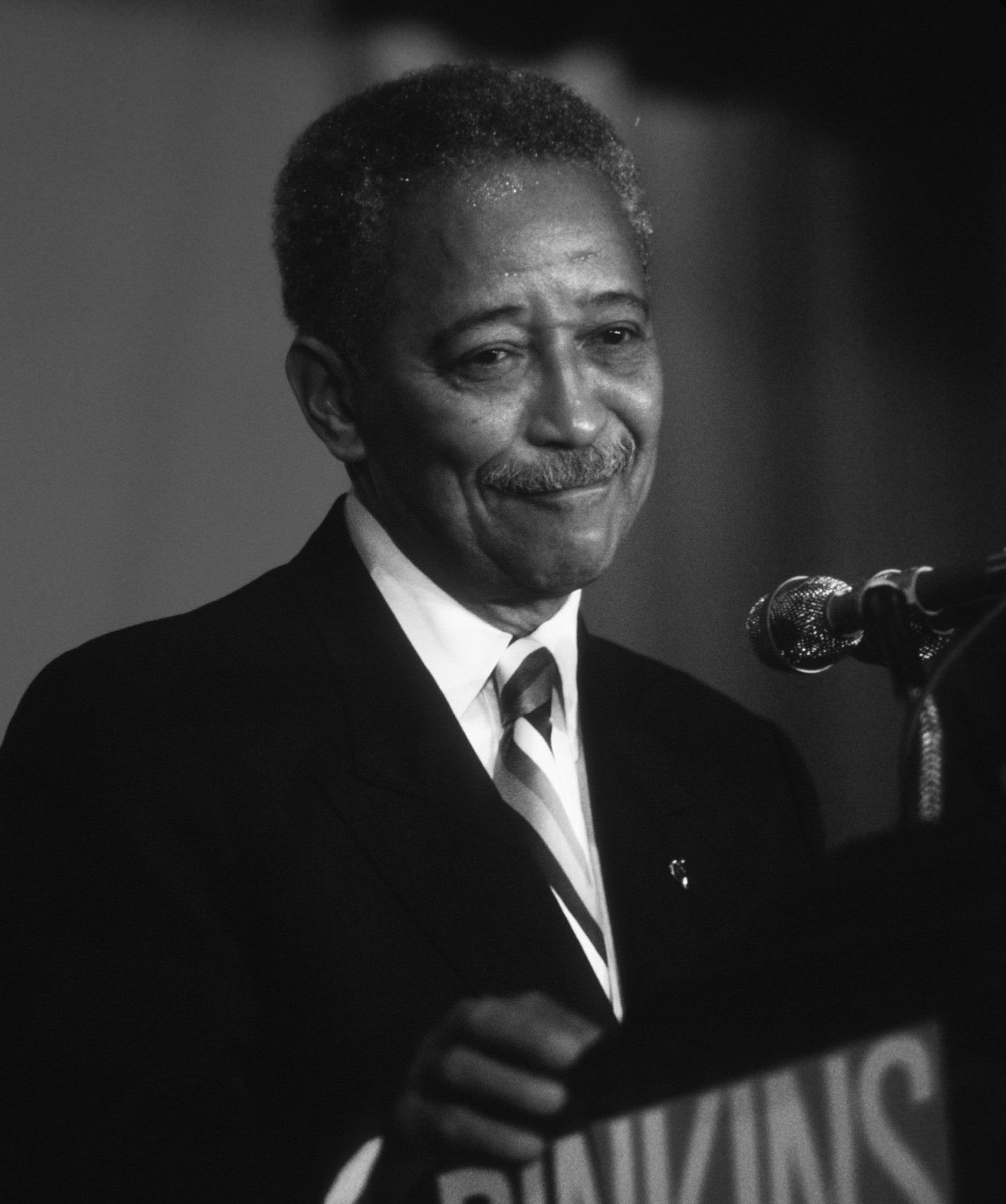 Dinkins, who served from 1990 to 1993, was the city’s last Democratic mayor before de Blasio. A then-28-year-old de Blasio volunteered on his campaign before landing a job as a City Hall aide.
As public advocate, de Blasio denounced Bloomberg’s policies on education and housing, though he’s toned down his criticism since taking office.
There were about 63,000 people living in homeless shelters at the start of this year, up from 51,500 when de Blasio took office. A third of families with children in homeless shelters have at least one family member working.
“Saying it will take ten years is tantamount to saying we have no real plan to close it,” said Cuomo’s lawyer.
Lindsay complained the state “raped” the city, and Rockefeller used a commission to investigate city government. After announcing he wouldn’t seek a third term, Lindsay admitted to thinking Rockefeller had “a personal vendetta” against him.
Koch, the mayor from 1978 to 1989, delighted in trash-talking his political opponents. He sabotaged his own bid for governor by making fun of upstate New York in a Playboy interview.
De Blasio worked under Cuomo when he was Bill Clinton’s secretary of Housing and Urban Development. The two sparred during the 2015 legislative session, after which de Blasio said of Cuomo: “What we’ve often seen is, if someone disagrees with him openly, some kind of revenge or vendetta follows.”
De Blasio wants to raise the city’s highest income tax rate from about 3.9 percent to 4.4 percent, bringing in between $700 million and $800 million a year.
Dinkins, who served from 1990 to 1993, was the city’s last Democratic mayor before de Blasio. A then-28-year-old de Blasio volunteered on his campaign before landing a job as a City Hall aide.
As public advocate, de Blasio denounced Bloomberg’s policies on education and housing, though he’s toned down his criticism since taking office.
There were about 63,000 people living in homeless shelters at the start of this year, up from 51,500 when de Blasio took office. A third of families with children in homeless shelters have at least one family member working.
“Saying it will take ten years is tantamount to saying we have no real plan to close it,” said Cuomo’s lawyer.
Lindsay complained the state “raped” the city, and Rockefeller used a commission to investigate city government. After announcing he wouldn’t seek a third term, Lindsay admitted to thinking Rockefeller had “a personal vendetta” against him.
Koch, the mayor from 1978 to 1989, delighted in trash-talking his political opponents. He sabotaged his own bid for governor by making fun of upstate New York in a Playboy interview.
De Blasio worked under Cuomo when he was Bill Clinton’s secretary of Housing and Urban Development. The two sparred during the 2015 legislative session, after which de Blasio said of Cuomo: “What we’ve often seen is, if someone disagrees with him openly, some kind of revenge or vendetta follows.”
De Blasio wants to raise the city’s highest income tax rate from about 3.9 percent to 4.4 percent, bringing in between $700 million and $800 million a year.
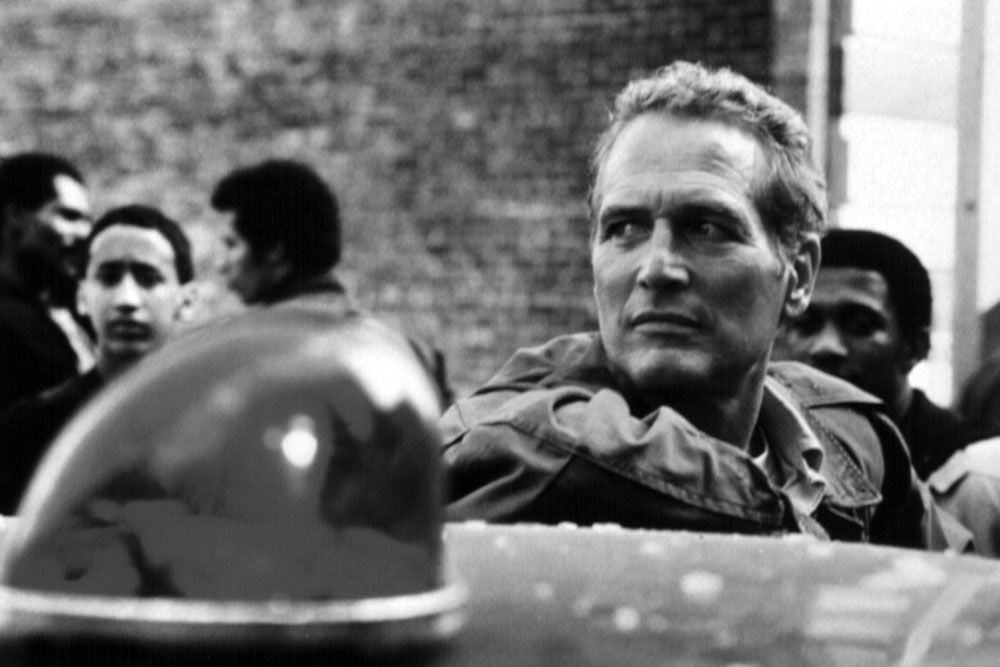 In ‘Fort Apache, the Bronx,’ Paul Newman is a cop tasked with policing the gang-ridden streets of the South Bronx. The Warriors, about a gang fighting its way to its home turf in Coney Island, provoked violence and vandalism at its screenings in 1979. Escape From New York, released in 1981, pictures Manhattan in 1997 as a maximum-security prison.
In ‘Fort Apache, the Bronx,’ Paul Newman is a cop tasked with policing the gang-ridden streets of the South Bronx. The Warriors, about a gang fighting its way to its home turf in Coney Island, provoked violence and vandalism at its screenings in 1979. Escape From New York, released in 1981, pictures Manhattan in 1997 as a maximum-security prison.
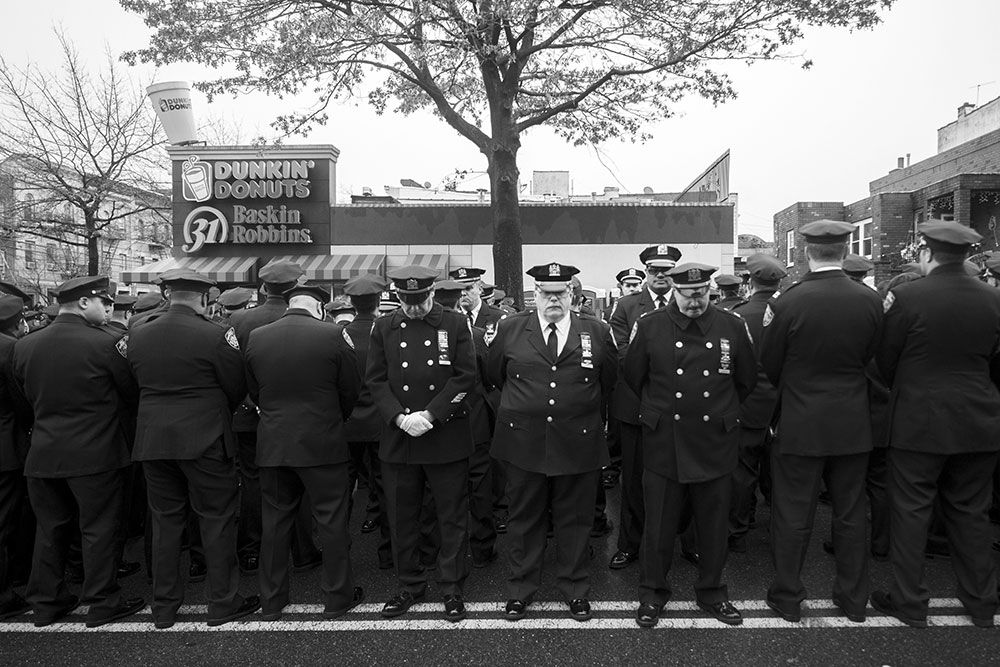 In 2014, an NYPD officer killed Eric Garner, an unarmed black man in Staten Island. After the officer was cleared of criminal charges, a man killed two cops in Bed-Stuy, supposedly in retaliation. That night, as de Blasio walked through the hospital where the officers had been pronounced dead, dozens of cops turned their backs.
William Bratton was New York’s police commissioner in the mid-’90s and then again from 2014 to 2016, when James O’Neill replaced him.
Sample New York Post headlines from this past summer: “De Blasio’s latest pathetic gym excuse”;
In 2014, an NYPD officer killed Eric Garner, an unarmed black man in Staten Island. After the officer was cleared of criminal charges, a man killed two cops in Bed-Stuy, supposedly in retaliation. That night, as de Blasio walked through the hospital where the officers had been pronounced dead, dozens of cops turned their backs.
William Bratton was New York’s police commissioner in the mid-’90s and then again from 2014 to 2016, when James O’Neill replaced him.
Sample New York Post headlines from this past summer: “De Blasio’s latest pathetic gym excuse”;“’Eco-friendly’ de Blasio won’t give up SUV rides to gym”; “Add morning naps to list of things de Blasio
does instead of work” In 2015 and 2016, the mayor’s appointees ruled that new one-year leases on rent-stabilized units could not increase. A property-tax break for developers who agree to set aside apartments for poor and middle-class tenants in new buildings. The City Council passed a law in 2013 mandating that all businesses with 15 or more workers provide paid sick leave. Under de Blasio, the law was revised to cover all businesses with more than five employees. In 1989, five black and Latino teenagers were accused of raping a young woman while she was jogging through Central Park. Before the teens went to trial, Trump bought full-page ads in the city’s major newspapers demanding their execution. Even after DNA evidence exonerated them in 2002, Trump insisted the men should have stayed in prison. This summer, Schumer called for a series of initiatives aimed at the working class, including measures to lower prescription-drug prices. Deferred Action for Childhood Arrivals: an Obama policy that gives work permits to undocumented immigrants who came to the U.S. as children.






























